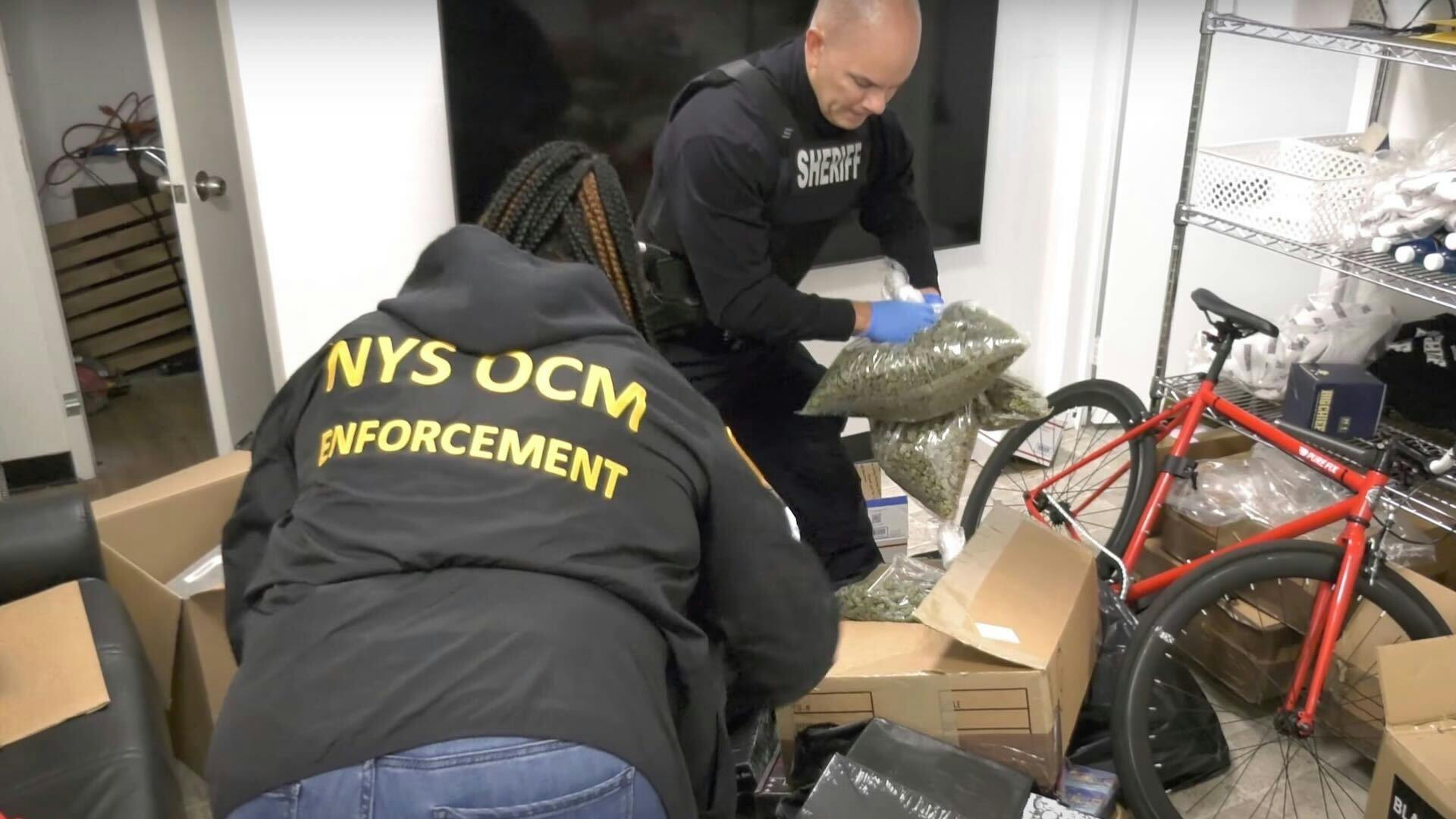Two businesses, owned by the same man, are suing the state of New York and the City of Sacramento. Both lawsuits challenge dispensary licensing programs favor state residents over out-of-state businesses.
Last week, a federal judge placed a temporary hold on 63 of New York’s 175 incoming dispensary licenses for adult-use cannabis. The state planned to give businesses controlled by people with New York cannabis convictions the first batch of adult-use dispensary licenses later this month.
But a company owned by a Michigan man has blocked nearly half of those licenses from being issued with a lawsuit that argues such programs discriminate against out-of-state residents and block interstate commerce.
Both of the plaintiff’s accusations, if proven true, would violate the constitution. So a federal judge granted a temporary injunction blocking New York’s ability to issue licenses in five regions, including Brooklyn and Central New York.
Why are 63 New York dispensary licenses delayed?
A corporation called Variscite NY One, Inc. filed for a preliminary injunction to restrain the Office of Cannabis Management (OCM) from issuing Conditional Adult-use Recreational Dispensary (CAURD) licenses in certain areas of the state.

Variscite is claiming the OCM’s dispensary license application program discriminates against out-of-state operators and blocks interstate commerce, a direct violation of the Dormant Commerce Clause, which keeps states from favoring their own economies over a healthy national marketplace.
According to the court, plaintiff Variscite, meets some of the criteria for Conditional Adult-use Recreational Dispensary (CAURD) applicants. One requirement Variscite checks off is the majority owner’s non-violent cannabis conviction. The problem is, the conviction was in Michigan, not New York. So the owner, a Michigan man named Kenneth Gay, is ultimately disqualified from the first round of CAURD licenses.
Who owns Variscite?
A Michigan resident named Kenneth Gay is the majority owner of Variscite New York One, Inc., which has been registered with the state of New York since August. Jeffrey Jensen owns the other 49%, according to court records.
Kenneth Gay and his lawyer, Christian Kernkamp, filed a similar lawsuit against The City of Sacramento and its cannabis office in February 2022, this time using a business entity called Peridot Tree.
Neither Variscite, nor Peridot Tree, appear to be licensed, prominent, or active cannabis operations in California, Michigan, or New York. The plaintiff’s lawyer told Leafly their client does not wish to comment on the lawsuit at this time.
Shop highly rated dispensaries near you
Showing you dispensaries nearAccording to court records, the plaintiff’s lawyer, Christian Kernkamp litigated a 2020 case that claimed LA County’s COVID-19 tracing laws violated the First and Fourth Amendment rights of a resident and a local Sushi restaurant.
Cookies is not connected to this lawsuit
On Thursday (November 17), a LinkedIn post by cannabis lawyer David B. Feder riled rumors that Cookies is behind this lawsuit. Some cannabis news outlets even published the rumors.
Feder uncovered documents that tie Variscite’s co-owner, Jeffrey Jensen, to a 2018 Cookies dispensary application that failed to get approved in Pasadena, CA. After hinting that Cookies may be driving the Variscite lawsuit, Feder directed the “Internet sleuths” on his page to investigate further.
On Friday (November 18), Feder retracted his statement and publicly apologized for implicating Cookies in the case. Feder said: “Sometimes you have to admit when you’re wrong… After speaking to the people at Cookies and getting clarification, and speaking to other people as well, I gotta let everybody know: There is no connection between Cookies and this lawsuit.”
Cookies CEO Berner called out the rumors on Instagram, in the comment section of a post by underground cannabis news source @theblacklistxyz, a private Instagram page followed by many industry heavyweights. On Instagram, Berner thanked Feder for clearing things up, writing, “Thank you. My apologies as well, sometimes stuff like this gets under my skin and I truly appreciate you posting the truth. The more we grow the bigger the target we are. I do really appreciate you clearing this up.”
“As it turns out,” Feder continued in his apology video, “Cookies, never ended up doing business with this guy.” Feder added that it’s “probably better off that they didn’t, because look who this guy is. He doesn’t care about New York’s social equity applicants and is freezing the whole program for everybody and shutting down several regions from being issued CAURD licenses and maybe who knows how far it’s gonna go.”
Feder added, “the bottom line is, I was wrong for presenting this information without the proper framing. And I appreciate the people of Cookies coming to me directly to clarify. This thing went way further than I had ever anticipated.”
“I think a lot of people who are haters of Cookies, or maybe Berner, were looking for something to hang their hat on (to) show that he’s really not for the people.”
David B. Feder ESQ
When did the Variscite vs The State of New York case begin?
The Variscite case was filed September 26, 2022, the exact day that the August 25-to-September 26 application window for CAURD applications closed. One month earlier (August 31), Variscite first registered with the state. The business was created less than a week after the CAURD application portal went live on August 25.
When asked about the timeline and intentions of the lawsuit, Variscite’s lawyer, Christian Kernkamp, told Leafly via email November 15, “Plaintiff is not making a statement at this time but we will be sure to include you if Plaintiff makes a statement in the future.”
On November 22, Kernkamp shared this statement from the plaintiff via email:
“The plaintiff, Variscite, had hoped to avoid enjoining cannabis sales in New York. Variscite made an offer to settle this case at no cost to the State so licensing could proceed, but the State never even gave us the courtesy of a response. The injunction could be over tomorrow, but the State prefers instead to litigate even though the court has already found a ‘clear likelihood’ that the State violated Variscite’s constitutional rights.”
Christian Kernkamp, representing Variscite NY One
Why did the court grant Variscite’s request to block New York licenses?
Last week (November 10), U.S. District Court Judge Gary Sharpe granted a temporary restraining order to Variscite. The judge cited cases in Maine, Missouri, Oklahoma, and Michigan where similar laws were successfully challenged on constitutional grounds, including the Dormant Commerce Clause. The court ultimately ruled that the state’s application requirements “will have a discriminatory effect on out-of-state residents seeking a CAURD license.”
On October 5, the court rejected a first request for the temporary injunction, which would have stopped some licenses then. The new ruling made Thursday (November 10) states that the New York Attorney General, arguing on behalf of the OCM and state, failed to provide a legitimate purpose for favoring New Yorkers impacted by the War on Drugs over non-residents.
Similar cases in Michigan and Maine also play on the tension legalization creates between states’ interests in protecting local businesses and the Dormant Commerce Clause of the Constitution. The clause forbids states from interfering with interstate commerce in ways that favor their own economies over those of other states.
Almost every state with a social equity program that favors residents is subject to similar litigation, but it will ultimately be up to Congress to ensure federal legalization strikes a balance.
Why is Variscite suing The State of New York?

It’s hard to say. The company claims that social equity programs infringe on owner Kenneth Gay’s constitutional rights. But there is a lot of subtext to consider.
Gay also owns Peridot Tree, a California company that is currently suing the City of Sacramento on similar terms. Gay could truly feel discriminated against by programs that favor state residents over non-residents. But many are questioning the plaintiff’s true motives.
What does Variscite stand to gain from delaying licenses?
It’s not clear. But speculation has been rampant. It’s been suggested that a special CAURD license could be in the cards for the plaintiff—not as a reward, but as a “shut up and go away” settlement. Other, more sinister, motives have also been floated, without evidence or corroboration.
No matter what the plaintiff’s motive is, federal law gives some credence to their claim. Still, the federal judge in the Peridot vs. Sacramento case in California chose to abstain from the matter on Thursday (November 17), citing the federal illegality of cannabis. Gay will now bring that case to the Ninth Circuit federal court for further judgement.
Ultimately, ending federal cannabis prohibition is the only way to stop lawsuits like this from becoming a national trend. Otherwise, the Dormant Commerce Clause, as applied here, could be used to derail social equity programs in almost every legal state.
The Variscite/Peridot plaintiff’s true motives are hard to pin down, for many reasons. There’s a lot of collateral damage to consider. The other cannabis businesses, wasted resources on application and legal fees, and potential blowback from impacted businesses all make this case high-risk and low-reward from the outside looking in. The Albany company’s Google reviews are already filled with negative comments posted in the past week.
What’s next in the Variscite vs. New York case?
A lawyer representing multiple applicants advised that the impacted licenses in Brooklyn, Finger Lakes, and other regions could be on hold for three to four months.
Despite the lawsuit, New York’s Office of Cannabis Management said it plans to move forward with its CAURD licensing program, characterizing the Variscite lawsuit as a minor setback.
The OCM plans to award the first class of CAURD licensees on Monday, November 21, at a board meeting that is open to the public.
An official OCM statement about the case to Leafly November 10 reads:
“We don’t comment on pending litigation. The Office of Cannabis Management is committed to the Marijuana Regulation and Taxation Act’s goals of including those impacted by the state’s enforcement of cannabis prohibition in the market that we are building and we are additionally committed to getting New York’s cannabis supply chain fully operational.”
Freeman Klopott, director of communications at OCM
On Friday (November 18), a CAURD applicant who applied in one the impacted regions shared an e-mail they received from the OCM, updating them on how the case would impact their application.
The email reads: “The New York State Office of Cannabis Management is in receipt of your application and is in the process of evaluating it and reviewing it for deficiencies.”
The email from the OCM continues, “Due to a recent court ruling however, the New York State Cannabis Control Board (Board) is unable to issue any licenses in the following five geographic licensing regions: Brooklyn, Central New York, Finger Lakes, Mid-Hudson, and Western New York. You have identified one of these five regions as your first regional choice. As the Office has received more applications than there are licenses available for each of the fourteen regions, only an applicant’s first regional choice will be considered. As such, the Board will be unable to issue licenses in these regions, until the judicial proceeding is resolved, or the plaintiff has withdrawn their complaint.”
“The Office will, however, continue deficiency review and will be communicating with applicants to resolve deficiencies in their applications. The Office will continue to communicate with applicants as updates become available.”
New York Office of Cannabis Management








